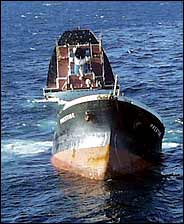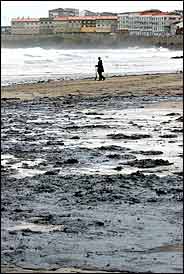

 |
| Associated Press |
| The crippled tanker Prestige, carrying more the 77,000 tons of fuel oil, split in two today and sank in the Atlantic Ocean 133 miles off the coast of Spain. |
 |
| Agence France-Presse |
| A stricken tanker carrying millions of gallons of oil split in two and was sinking off northwest Spain today. Above, Navy soldiers attempted to clean a polluted beach in Cayon, Spain. |
MADRID, Nov. 19 — In a sinking foretold by anxious environmentalists and fishermen, the crippled tanker Prestige, carrying more than 77,000 tons of fuel oil, split in two and sank in the Atlantic Ocean 133 miles off the Spanish coast, threatening to cause an environmental catastrophe in the area's rich fishing grounds.
The aft sank at around lunchtime, leaking fuel oil into waters already stained by a slick that has followed the ship on its tortuous journey out to sea, but the fore remained afloat for several more hours before finally sinking beneath the waves just before nightfall.
There were no immediate signs that the ship had shed its entire load.
Optimists hope that the sinking, in waters 11,800 feet deep, will avert any further pollution, arguing that the fuel should solidify and rest on the bottom.
But environmentalists fear that the ship's tanks could burst on the way down, exacerbating a situation they already classify as "catastrophic" for Spain's northwest region of Galicia.
The crisis, played out in agonizingly slow motion for almost a week amid foul weather, recriminations and political fallout, has prompted the European Commission to demand that European Union member states speed up implementation of new maritime safety rules agreed in 1999 after the Erika spilled 11,000 tons of fuel off Brittany.
Spain, which blames the British colony of Gibraltar for the crisis on the ground that the aging tanker was headed there, has also tussled with Portugal, both countries insisting that the other now take responsibility for the Prestige.
The ship's Greek managers, Universe Maritime, held back from criticizing Madrid's decision to haul the ship as far away as possible from Galicia, rather than offering a port of refuge where the tanker might have been repaired and its cargo offloaded with a minimum of damage.
"The fact that the vessel did have to go out 120 miles into some fairly hostile conditions has no doubt contributed to the situation we are in, but one has to look at it from an environmental point of view," a spokesman said. "It's a brave politician who says perhaps the best thing to do is to beach her."
Environmentalists, and even Galician fishermen interviewed by the Spanish news media, were not so sure.
"No one knew how long the ship could survive, but the time and the conditions have been in place since last Wednesday to transfer the cargo to another ship and avoid this problem," said Luis Suárez of the Worldwide Fund for Nature-Adena. "It was not done and we don't know why not, it does not seem logical."
Mariano Rajoy, the deputy prime minister and a native of Galicia, toured the region on Monday by helicopter, seeing miles of cliffs and beaches stained black by the evil-smelling tar leaked by the Prestige last week.
Several other slicks threaten pristine stretches of coastline north and south of the area that has been already hit, and thousands of fishermen fear for their livelihoods.
Galicia is an important source of shellfish, producing mussels, clams, crabs and the exotic and highly-prized goose barnacles, which look prehistoric and grow on rocks at the shoreline. Christmas is the most important period for the fishermen, who say compensation payments simply cannot make up for their losses.
Prices have already risen to reflect a ban on fishing in the affected area, with goose barnacles selling for an exorbitant $120 a kilo.
Mr. Rajoy told reporters that the government's action had averted "a greater catastrophe," and that the impact of the incident "is less 145 miles out than near the shore."
He added that Portugal and Spain were cooperating to resolve the problem, though as the ship moved out to sea Lisbon and Madrid each claimed the other had responsibility for the Prestige.
Its managers say that on Monday night a Portuguese destroyer insisted that the ship turn west, away from Portuguese waters, and on to a course the salvage team had not chosen; "and then we see the ship breaking up," added the spokesman.
The managers also defend the ship's captain, who has been jailed by the Spanish authorities, accused of failing to cooperate with the salvage operation.
Spanish officials say he obstructed a tug's efforts to secure a line and then refused to start up the ship's engines, which were subsequently blamed for widening a crack in the hull.
Universe Maritime blame the tug for the 14-hour delay in securing the line, during which time the ship drifted 20 miles to within 5 miles of the coast.
Britain strongly denies any link between the accident and negligence on the part of Gibraltar, and says the ship was not heading for the colony, a statement backed by the ship's managers and by